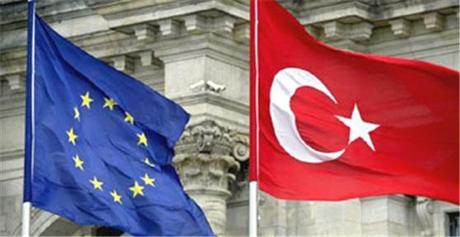Die Aussenminister von Schweden (Carl Bildt), Italien (Franco Frattini), Grossbritannien (William Hague) und Finnland (Alexander Stubb) haben in der New York Times einen Artikel veröffentlicht, in dem sie die Aufnahme der Türkei in die EU befürworten.
 Sie verlangen Weitsicht und fuehren gute Gruende auf, warum die Tuerkei in die EU aufgenommen werden sollte. Unter anderem schreiben sie, dass voraussichtlich die Tuerkei im Jahre 2050 die zweitstaerkste Wirtschaftskraft in Europa sein wird, und dass das Land am Bosphorus die europaeischen Energie-, Wirtschafts- und Sicherheitsinteressen vom Fernen Osten bis in den Mittelmeerraum foerdern und sichern wuerde.
Sie verlangen Weitsicht und fuehren gute Gruende auf, warum die Tuerkei in die EU aufgenommen werden sollte. Unter anderem schreiben sie, dass voraussichtlich die Tuerkei im Jahre 2050 die zweitstaerkste Wirtschaftskraft in Europa sein wird, und dass das Land am Bosphorus die europaeischen Energie-, Wirtschafts- und Sicherheitsinteressen vom Fernen Osten bis in den Mittelmeerraum foerdern und sichern wuerde.
Natuerlich erwarten sie auch von der Türkei, ihren Pflichten bezügl. der Menschenrechte, Reformen etc. schnellstmöglich nachzukommen und der EU anzugleichen. Das sind die Voraussetzungen für eine Vollmitgliedschaft fuer jedes Bewerberland.
Ein Gastbeitrag von dontyoubelievethehype.
 Sie verlangen Weitsicht und fuehren gute Gruende auf, warum die Tuerkei in die EU aufgenommen werden sollte. Unter anderem schreiben sie, dass voraussichtlich die Tuerkei im Jahre 2050 die zweitstaerkste Wirtschaftskraft in Europa sein wird, und dass das Land am Bosphorus die europaeischen Energie-, Wirtschafts- und Sicherheitsinteressen vom Fernen Osten bis in den Mittelmeerraum foerdern und sichern wuerde.
Sie verlangen Weitsicht und fuehren gute Gruende auf, warum die Tuerkei in die EU aufgenommen werden sollte. Unter anderem schreiben sie, dass voraussichtlich die Tuerkei im Jahre 2050 die zweitstaerkste Wirtschaftskraft in Europa sein wird, und dass das Land am Bosphorus die europaeischen Energie-, Wirtschafts- und Sicherheitsinteressen vom Fernen Osten bis in den Mittelmeerraum foerdern und sichern wuerde.Natuerlich erwarten sie auch von der Türkei, ihren Pflichten bezügl. der Menschenrechte, Reformen etc. schnellstmöglich nachzukommen und der EU anzugleichen. Das sind die Voraussetzungen für eine Vollmitgliedschaft fuer jedes Bewerberland.
Moreover, E.U. integration is about strengthening the rule of law and common European values and standards all over the Continent. This is apparent not least in Turkey, where E.U.-inspired liberal reforms have turned the country into one of Europe’s principal growth engines.
The crucial question is not whether Turkey is turning its back on Europe, but rather if Europe is turning its back on the fundamental values and principles that have guided European integration over the last 50 years.
In some quarters there is clearly some anxiety regarding the consequences of a Turkish E.U. membership. The doubts over admitting a large and self-confident nation are as explicit now as they were when Britain once applied — facing strong opposition from older members of the club. Voices of opposition were also heard when Sweden and Finland knocked on the door to the E.U.
Concerns are legitimate — but the counter-argument is clear: New members can help Europe return to economic dynamism and take on its proper weight in world affairs. By pushing prospective candidates toward liberal reforms and full respect for human rights, the European space of stability and growth can expand further.
In the back of our minds we should also remember that Turkey, like no other country, has the ability to advance European interests in security, trade and energy networks from the Far East to the Mediterranean.
The newly released Commission Enlargement Strategy clearly shows that the membership perspective is still a forceful agent of change.
Fifteen years after the conflict in the Western Balkans, all the countries of the region now have a clear European perspective. Turkey is in the midst of a far-reaching reform process. The application of Iceland, which is now at the start of its membership negotiations, proves that the E.U. remains attractive all over Europe.
Turkey is in a class of its own. It is an influential actor on the world stage with considerable soft power. Its economy is expected to expand by more than 5 percent this year, compared with a eurozone average of 1 percent. The O.E.C.D. predicts that Turkey will be the second-largest economy in Europe by 2050.
Turkish entrepreneurs in Europe already run €40 billion worth of businesses and employ 500,000 people. A Turkish economy in the E.U. would create new opportunities for exporters and investors, and link us to markets and energy sources in central Asia and the near east. So the security and economic case for Turkish membership is strong.
Ein Gastbeitrag von dontyoubelievethehype.

